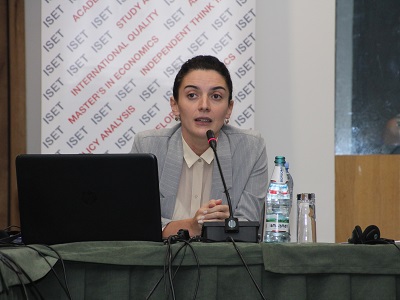On 23 April 2021 Salome Gelashvili conducted a presentation on the “Cost-Benefit Analysis of Climate Change Adaptation Measures in Agriculture”, within the framework of a sector-specific workshop in agriculture organized under the 2021 CRED Coaching program. The latter includes a series of training sessions on the application of the e3.ge macroeconomic model, implemented under the BMU financed “Policy Advice for Climate-Resilient Economic Development” program (CRED).
Under CRED’s current activities in Georgia, GIZ together with its technical implementing partner – GWS (Gesellschaft für Wirtschaftliche Strukturforschung GmbH) – has developed a macroeconomic dynamic Input-Output model, entitled e3.ge (standing for Economy, Energy, and Environment). The e3.ge model estimates the economic effects of the impacts of climate change and adaptation to climate change at the macroeconomic and sectoral level in Georgia.
The objectives of the sector-specific workshop in agriculture were the formulation of e3.ge modeled climate change effects and adaptation scenarios in the Georgian agricultural sector and a discussion of the options for financing adaptation measures in the sector.
Within the presentation, Salome Gelashvili alongside other experts examined the climatic effects that have damaged agriculture in the past, expectations regarding climatic threats in the future, and their socio-economic consequences. The experts also discussed climate change adaptation measures, options for financing, and climate change scenarios for the agricultural sector.











